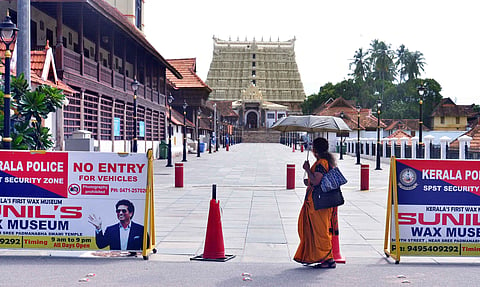

NEW DELHI: Upholding the rights of the Travancore royal family in managing the affairs of Sree Padmanabhaswamy Temple in Thiruvananthapuram, the Supreme Court on Monday resolved the decade-old dispute over the administration of one of the richest temples in the world. A two-judge bench headed by Justices UU Lalit and Indu Malhotra overruled a 2011 Kerala High Court order, which had directed the state government to set up a trust to take control of the management and assets of the temple, and held that the family will continue to have shebait rights.
The top court ordered that the District Judge of Thiruvananthapuram shall head an administrative committee to manage the affairs of the temple till a final committee is constituted by the royal family.
“The administrative and advisory committees shall do well to discharge all their functions including performance of the worship of the deity and maintenance of its properties, diligently and in the best interest of the temple, and provide adequate and requisite facilities to the worshippers,” the judgment stated.
The bench left it to the committee to decide on the question of unlocking Vault B, a large mysterious chamber in the temple which has remained untouched on account of the belief that its opening will spell doom for whoever opens it.
“The committees shall consider whether Nilavara B is to be opened for the purpose of inventorying. The interim orders dated 27 November 2014 and 4 July 2017 passed by this court had recorded that Nilavara B was not opened, and it was directed that inventorying with respect to the said vault be undertaken only after obtaining express orders from this court. We deem it appropriate to leave this issue to the best judgement and discretion of the committees.”
The judgment noted that the committee shall preserve all treasures and properties endowed and those belonging to the temple. “Protect all tenanted properties and take appropriate measures to ensure reasonable returns from such tenanted properties,” the 218-page judgment reads.
“Ensure that all rituals and religious practices are performed in accordance with the instructions and guidance of the chief thantri of the temple and according to customs and traditions. In temporal matters, the committees shall be guided by the advice given by the chief thantri. The designation of the chief thantri shall be done in accordance with the customs and traditions,” the order directed.
ALSO READ | Focus back on vault B of Padmanabhaswamy temple
It added that audit for the past 25 years as suggested by the amicus curiae shall be conducted by a firm of reputed chartered accountants. The bench directed the committee to file reports by second week of December 2020 stating all the developments along with the audited accounts and the balance sheets. The judgment came on an appeal filed by Uthradam Thirunal Marthanda Varma, younger brother of the last ruler of Travancore.
While deciding the decade-old dispute over the administration of Sree Padmanabhaswamy Temple in Thiruvananthapuram, the Supreme Court on Monday held that the proposals regarding the administrative committee and the delegation of powers to it came from the family itself.
A bench of Justices U U Lalit and Indu Malhotra also constituted an advisory committee which will have a retired high court judge who shall be nominated by the Chief Justice of the Kerala High Court and who shall be the chairperson of the committee, one eminent person to be nominated by the trustee and a reputed chartered accountant to be nominated by the chairperson in consultation with the trustee.
The bench made it clear that the principle of escheat will not apply and, hence, the properties of the temple cannot be reversed to the state after the death of the last ruler in 1991.
“We hold that the death of Sree Chithira Thirunal Balarama Varma who had signed the covenant, would not in any way affect the shebaitship (right to manage the financial affairs of the deity) of the temple held by the royal family of Travancore,” the bench said.
“After such death, the shebaitship must devolve in accordance with the applicable law and custom upon his successor and that the expression ‘Ruler of Travancore’ as appearing in Chapter III of Part 1 of the TC Act must include his natural successors according to law and custom; and that the shebaitship did not lapse in favour of the state by principle of escheat.”
This essentially means that the royal family will continue to act as the trustee of the temple and will have rights to offer prayers, have a say in the temple management. In its 281-page judgment, the bench also directed that all members of the committee must be Hindus and will function in accordance with the pertinent statue in the state.